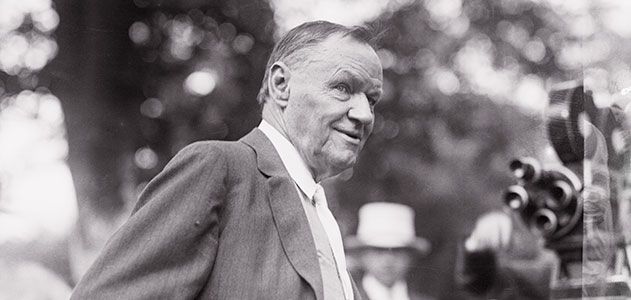In the Footsteps of Clarence Darrow
A lot more law students initially contemplate careers in criminal defense law than those who eventually pursue them. Aimée Sutton and David Marshall share their perspective on what life is like for those who didn’t steer clear of criminal law in the November 2016 issue of NWLawyer.
By Aimée Sutton and David S. Marshall
A lot more law students initially contemplate careers in criminal law than eventually pursue them. Here’s our report to lawyers who have steered clear of crime on what life is like for those of us who didn’t.
Many people enroll in law school with images of themselves as criminal defense lawyers because of the drama that seems inherent in the work. Perhaps To Kill a Mockingbird could have focused on a challenging contract Atticus Finch had to write for the sale of a hardware store or on his ordeal persuading the Maycomb County planning office to approve a new subdivision. But instead Harper Lee took the easy way to dramatic intensity: she gave Finch a rape trial.
How does the reality of criminal defense work measure against its portrayal in fiction? Well, the fiction is a lot more exciting than the lives we live (you guessed that, didn’t you?), but we do experience some of the drama that inspires the fiction.
For example, the dramatic crucible in most criminal lawyer fiction is a jury trial. In real life, criminal defense lawyers do try cases, and usually to juries.
In criminal trials, liberty is on the line. (Every now and then, for some criminal defense lawyers, life is on the line.) When one knows that one’s client will go away for many years if the trial goes badly, it’s easy to keep one’s mind in the game.
Trials happen often in criminal cases because compromises that satisfy both sides are difficult to find. In civil litigation, the dollars can be sliced very fine to get to a settlement everyone can live with. In criminal cases, though, stark and unavoidable divides separate categories of outcome: guilty or innocent, felony or misdemeanor, imprisonment or community service hours, sex offender registration or not. (Speaking of sex offenders–compromising is especially difficult in sex offense cases, a big part of our practice. The defendant usually does not want to agree that he’s even a minor sex offender.)
Criminal defense at the trial court level is not a desk job. Most criminal defense attorneys spend the bulk of their time on the road: in the courthouse, interviewing witnesses, and visiting clients in various jails. Every law job is part scholarship, part action. In trial-level criminal defense, the balance tilts strongly toward action.
There are motions to file and briefs to write, of course. But the variety of issues in criminal practice is not as great as what many civil litigators encounter, so a criminal lawyer’s legal research and writing skills get exercised less vigorously and maybe less frequently.
A criminal defense lawyer spends a lot of time reading police reports and talking to cops. From this comes wisdom that most lawyers don’t receive. Detectives often given one handy tips, such as, “Follow the server to the restaurant’s credit card machine so no one can steal your identity.” Thus one can live more safely—or one can just become paranoid.
One also sees a lot of text messages and selfies that teenagers should not be sending. This can make one a parent who gives lots of lectures and frequently inspects phone histories.
Atticus Finch lost that rape case, but most fictional criminal defense lawyers do well in trial. They enjoy happy endings. In the real world, Atticus Finch’s experience is more common. In most criminal trials, the defense loses. That’s the way it should be; if a prosecutor’s office isn’t winning a big majority of the cases it brings, it is bringing cases it should not bring and putting a lot of innocent people in jeopardy. Most prosecutors show proper restraint in charging and compromising cases, so defense attorneys must learn to endure rejection by juries.
Even though prosecutors are always a defense lawyer’s adversaries, relationships with opposing counsel are not so vicious as they are frequently portrayed in popular fiction. In real life, defense lawyers hope to face off against excellent prosecutors—lawyers with a sense of proportion, attention to nuance, and empathy that embraces crime perpetrators as well as crime victims. And it happens more often than TV shows would let you think. Encountering such prosecutors is one of the satisfactions of the work.
Criminals are not popular people. Not as a group, at least. But we find it easy to care about our clients—even those whom we know have done terrible things. Often we even like them. That’s because we get to know them. Like everyone else, they are complex mixtures of strengths and weaknesses, virtues and vices. We look for the good, and we usually find some.
Most criminal defendants are easy to work with. They are in deep trouble, so they are scared. They know they depend on our help, and they often express gratitude for it. Of course, there are some exceptions—for example, the mentally ill, many of whom become criminal defendants. But divorce lawyers often have more difficult client relations than we do.
Civil litigation, in our experience, can get nasty. We’ve seen some very low blows struck there. For some reason, this doesn’t happen as much in criminal law. Maybe it’s that the criminal bar— prosecutors and defense attorneys together—is smaller. Its members see each other around the courthouse often. In small communities like that most people find the price of acting like a jerk too high.
Or maybe it’s that a lot of criminal practice takes place in court, where judges are on hand to deal with bad behavior. Whatever the cause, we appreciate the civility of criminal practice.
Ask any ten civil litigators what they dislike most about their work, and ten will say, “Interrogatories!” In criminal litigation, there are no interrogatories. Ever. In criminal cases, court rule obliges both sides to provide discovery—prosecutors, quite a lot of discovery, defense lawyers, a lot less. Both sides escape the case-after-case grind of answering routine interrogatories.
On rare occasions a criminal defense attorney will get a good plea bargain because a State’s witness is desperate to avoid trial. Maybe the parents of a child complainant are adamant that the child not testify.
But, unlike civil lawyers, criminal defense lawyers don’t get good deals because opposing counsel fear trial. Prosecutors go to trial often. And unlike attorneys with contingent fee cases, prosecutors don’t suffer a pay cut when they go to trial and lose. A criminal defense lawyer gets no mileage from saying ominously during negotiations, “It looks like we’ll have to take this to trial.”
Sometimes, though, one gets mileage from showing that one intends to fight the prosecutor every inch of the way. No one likes to work evenings and weekends.
When trial comes, defense lawyers face the challenge of finding jurors who will apply the rules—legal rules that defy the way the brain actually works. Is it humanly possible for a juror to “presume the defendant innocent” throughout his trial for a heinous crime? Or to presume him innocent of all of a variety of crimes tried at one time? Is it possible for a juror not to be influenced at all by a defendant’s choosing not to testify? The bedrock principles of an American criminal trial sound great, but defense lawyers never find it easy to get them applied.
For us, the worst part of our jobs is enduring the minutes between learning the jury has reached a verdict and hearing the verdict announced. It’s especially rough in sex cases because in them Washington law allows no release pending sentencing or appeal; if the news is bad, the client sitting next to us will immediately be taken to jail and probably won’t taste freedom again until he has spent years in prison.
It’s therefore not joy we feel when a client is acquitted. It’s relief. Tremendous relief. Our client has dangled over the abyss, but we’ve managed to pull him back to level ground. His life can go on.
After a good night’s sleep, we’re ready to go at it again.







